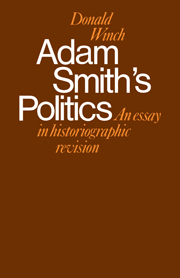Book contents
- Frontmatter
- Contents
- Acknowledgements
- Abbreviations
- 1 Introduction: the problem – the liberal capitalist perspective
- 2 Republicanism and sceptical Whiggism
- 3 Hutcheson and Smith: Real Whig versus sceptical Whig
- 4 Commerce, liberty and justice
- 5 Martial spirit and mental mutilation
- 6 A ruinous expedient
- 7 The present disturbances
- 8 Conclusion
- Bibliography
- Index
- Title in the series
5 - Martial spirit and mental mutilation
Published online by Cambridge University Press: 03 February 2010
- Frontmatter
- Contents
- Acknowledgements
- Abbreviations
- 1 Introduction: the problem – the liberal capitalist perspective
- 2 Republicanism and sceptical Whiggism
- 3 Hutcheson and Smith: Real Whig versus sceptical Whig
- 4 Commerce, liberty and justice
- 5 Martial spirit and mental mutilation
- 6 A ruinous expedient
- 7 The present disturbances
- 8 Conclusion
- Bibliography
- Index
- Title in the series
Summary
By deciding to include a separate section in his Lectures on Jurisprudence on ‘arms’, and in expanding the treatment given to this subject in Book v of the Wealth of Nations, Smith was, of course, addressing himself to what he described as ‘the first duty of the sovereign’. His aim in dealing with this subject remained that given in the introduction to the Lectures.
Though the peace within-doors be never so firmly established, yet if there be no security from injuries from without, the property of individuals cannot be secure. The danger to them on this head is no less to be feared than from those of their own society; and not only is the security of private persons in danger, but the very being of the state. It is therefore requisite that an armed force should be maintained, as well to defend the state against external injuries as to obtain satisfaction for any that have been committed! In treating of this subject we shall consider the various species of armed forces that have been in use in ancient and modern states, the different sorts of militias and trained bands, and observe how far they were suited to the different natures of governments.
In practice the issue resolved itself into an examination of the merits of various kinds of citizen's armies or militias when compared with those associated with mercenary or professional armies at different stages in the development of society and of the military arts. When Smith was first giving shape to his lectures in the 1750s and 1760s, the militia question was an especially lively one in Scotland, particularly among his close friends and acquaintances.
- Type
- Chapter
- Information
- Adam Smith's PoliticsAn Essay in Historiographic Revision, pp. 103 - 120Publisher: Cambridge University PressPrint publication year: 1978

